‘No winning’: US working mothers on losing ground to COVID
A year into the COVID-19 pandemic, Al Jazeera spoke to working mothers in the United States about the impact the crisis has had on their careers, finances, families and mental health.
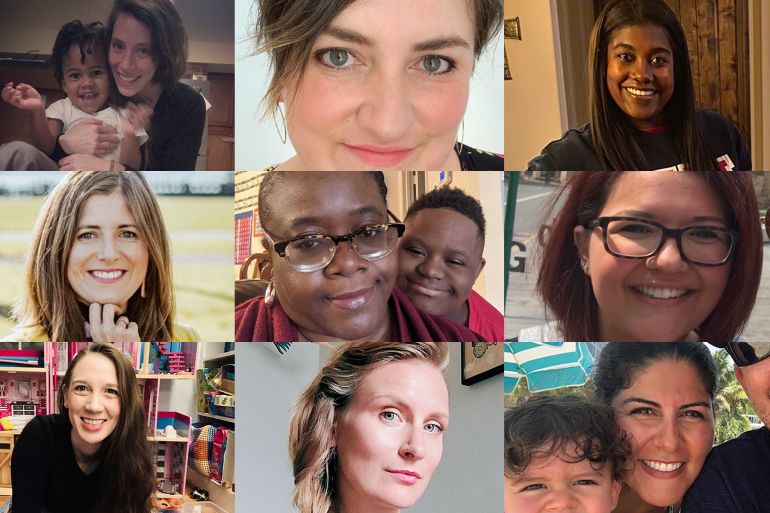
COVID-19 has taken a toll on virtually every part of the global economy, but not every group has felt the pandemic’s devastation equally. Women forced into the “double shift” of working and caregiving have borne the brunt of the crisis, and two million women in the United States alone have left the workforce since February 2020, with economists warning that a “lost generation” of working parents may never bounce back.
Keep reading
list of 4 items‘Motherhood penalty’ starts even before kids, study finds
Coronavirus recession will hit women harder, experts warn
Gender penalty: Student debt and daycare stifle American mothers
To be clear, many mothers said the system wasn’t working before the pandemic. Worldwide, women do at least two and a half times more unpaid housework and caregiving than men, according to the United Nations, even if both people work full time outside of the home. In the US, gender pay disparities and the lack of a social safety net in the form of paid family leave and affordable childcare exacerbate that reality.
The US is the only developed country in the world without any mandated paid maternity leave. Here, childcare can cost more than in-state university tuition and women are paid 82 cents to every dollar earned by men. The gap is even wider for women of colour: Black women in the US must work an extra seven months to earn what white men earn in an average year.
Women with children are often viewed as less competent and committed to their work in what’s known as the “motherhood penalty”, which also sees them passed over for positions, raises and promotions. Taking time out of the labour force to raise children impacts women’s lifetime earning potential as well. By the end of their careers, women have, on average, just 70 percent of the retirement funds men do.
Working mothers faced those structural barriers before COVID-19. But the pandemic upended life as we know it — bringing fresh challenges and even less support. In honour of International Women’s Day, Al Jazeera asked American mothers who left jobs, lost jobs or had their careers take a hit about what the last year has meant to them — and taught them. Here are their stories.
Meg Brannon, 35, education specialist in Virginia: ‘Mothers are collateral damage.’
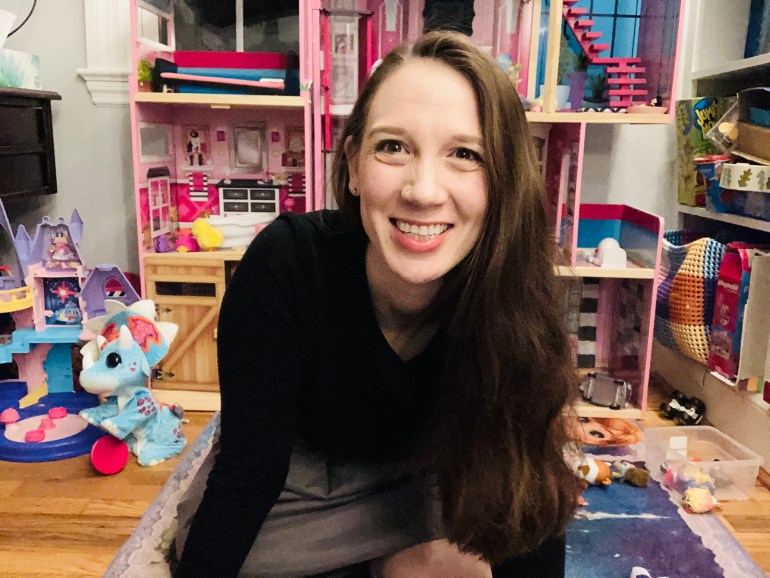
Have you ever played a game where you get a series of bad hands? You think, “I can still win this” even when it’s already too late. That’s working motherhood for me. High-risk pregnancies. Unpaid maternity leaves. A premature baby. Postpartum depression. A special-needs child. Childcare costs higher than my net income. Each a step further behind.
Lost income, insurance, raises, promotions, job opportunities. And while we started roughly equal, by the end of my childbearing years, my husband made 200 percent of my salary. Even then, I thought, “I can still win this.” It wasn’t until the pandemic hit that I realised the systemic taxation of motherhood had already won. With multiple children under five, no support, childcare or even Zoom school, the career I fought so hard for was over.
The game is rigged. The pandemic exacerbated issues in our society and social systems that oppress careers for mothers. There is hope for this pandemic, but what about the next one, or the next caregiver role that needs filling? Over five million women lost their jobs in 2020 in America. While I plan to rejoin the workforce, society has shown us that our careers are a privilege that can be taken away at any point in the service of a world in which mothers are collateral damage.
Opal Foster, 46, graphic designer in Maryland: ‘The pandemic has been an added weight to the house of cards that is our daily life.’
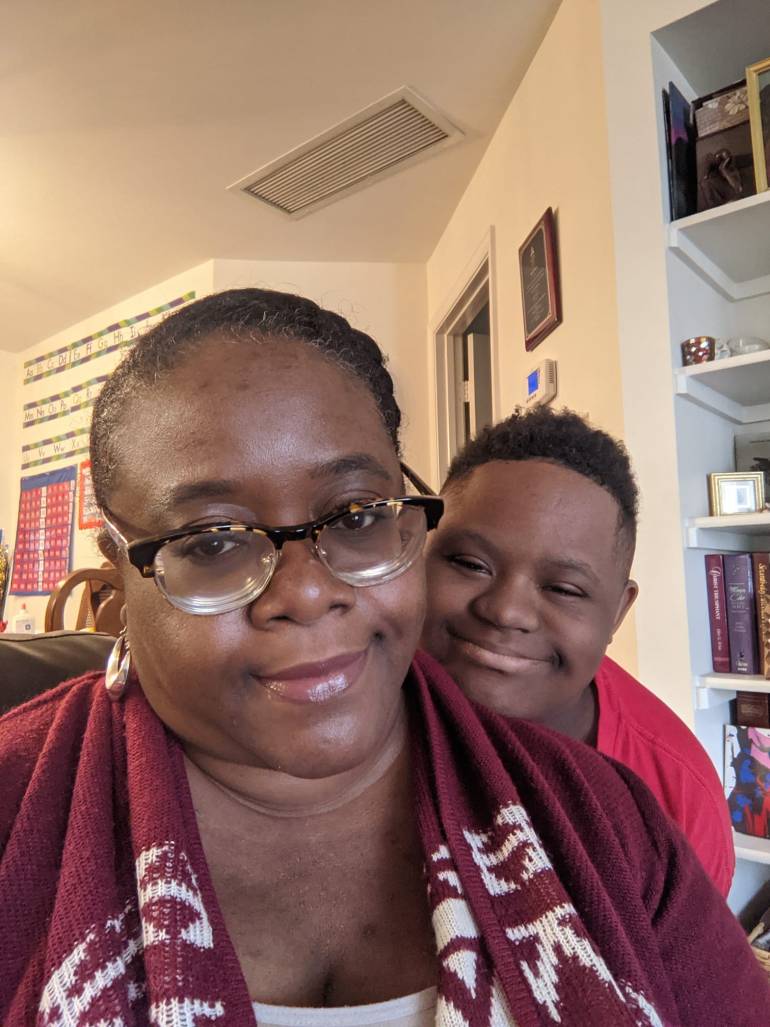
As a single mother of a child with special needs, the pandemic has been an added weight to the house of cards that is our daily life. Homeschooling, entertaining our kids, making sure everyone is well, fed and clean leaves little time for sleep, no time for self-care and no time to mourn the tragic losses that the pandemic has left behind. We miss our friends and family deeply, and the social interactions that we used to find cumbersome — too many birthday parties in a weekend, holidays with families, PTA meetings, church bake sales, parent meet-ups — are being replaced with virtual activities that can’t fill the void that our need for physical touch merits.
The financial strain has been taxing. I am currently working a part-time job while still freelancing to have a schedule that will allow me to homeschool my son and make a living. Most months, there is a toss-up for which bills get paid, and which ones will wait.
Working from home has been a blessing. In previous positions, taking off time for my son’s medical appointments was frowned upon, like I wasn’t being a team player. Employers need to know that for women to be a viable part of the workforce, there need to be allowances made to ensure a proper work-life balance. Besides improved retention rates, it’s the right thing to do. This keeps your best employees happy, balanced and whole.
Megan Waltz Peebles, 31, biotech clinical affairs specialist in Wisconsin: ‘There’s no winning at parenting right now.’
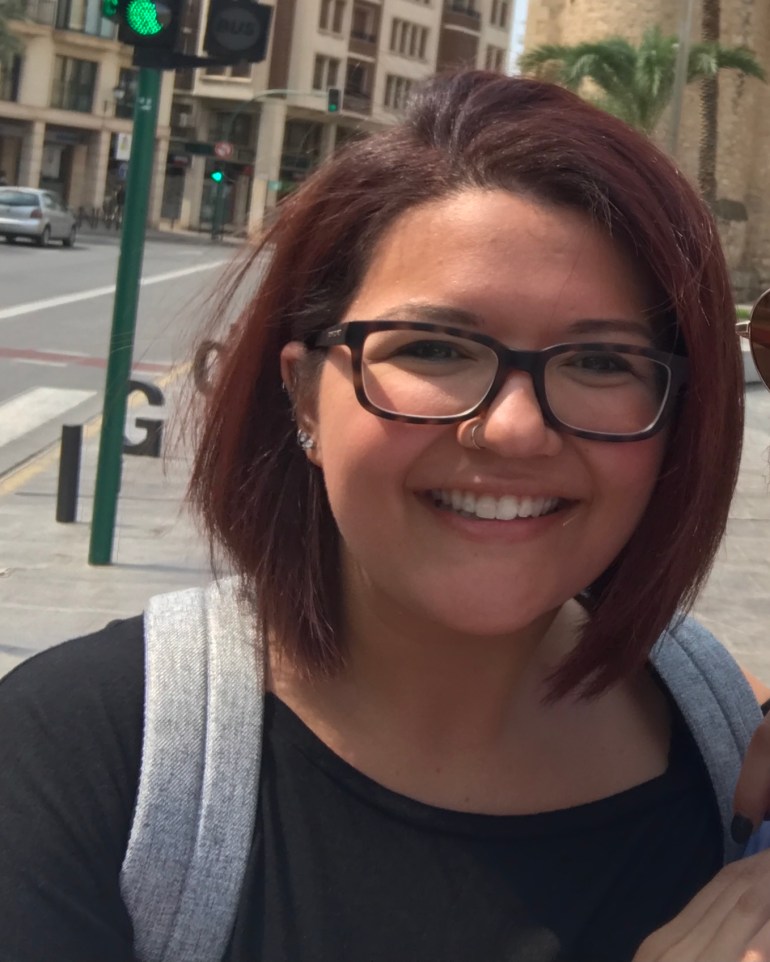
I quit my job in 2020 when our state closed daycares and schools. It wasn’t feasible for my husband or me to work remotely and wrangle our toddler and do virtual school with our third grader. I’d originally planned to take time to refocus my career and enjoy the summer with my kids, but that leave has been extended indefinitely.
When my husband lost his job in June, we had no income for months due to the unemployment insurance backlog. My claim was denied because I wasn’t available to work since we didn’t have childcare. Our savings was gone, so we put essentials on credit cards. We’re just now digging out of that hole.
I will do anything for my kids, including forgoing a meaningful career in clinical research to keep them safe during a global pandemic. There’s no winning at parenting right now. If we’re forced to simultaneously be employees, parents, and teachers, we need flexible accommodations, and there’s pressure from employers – real or imagined – to get kids back to school or daycare ASAP.
If we leave our jobs to focus on our families, we’re punished financially, and there’s no benefit designed to support us in this unprecedented time. If we lose or are unable to continue work due to a global health crisis, we deserve to be supported so that we can at least pay our rent, buy diapers, and have reliable internet access so our kids can learn.
Jessica Goddard, 37, consultant and writer in New Jersey: ‘If there were epic meltdowns in the background of my husband’s calls, it was charming. If there were for mine, it was horrifying.’
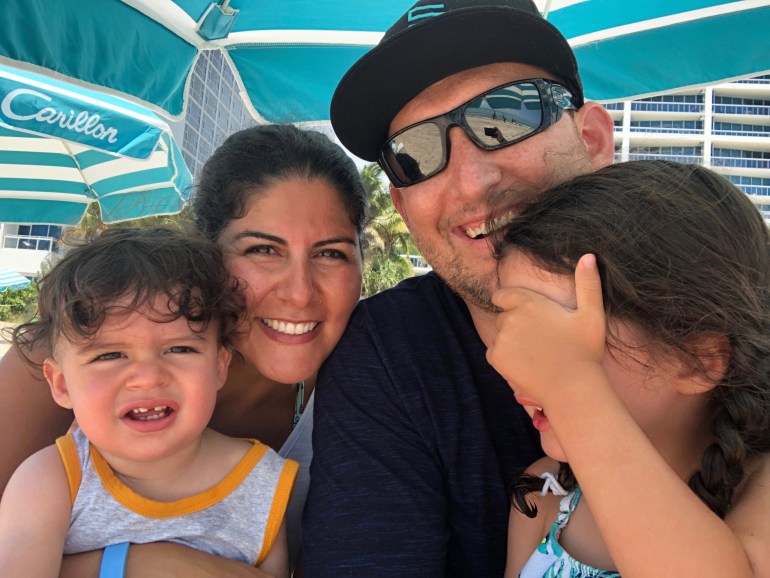
Long before the pandemic, I worked remotely with two young kids and a dog in a two-bedroom apartment. But my husband went to an office, our toddler was in preschool and the baby was with the nanny. Like many in the New York City area, in March 2020, my daughter’s school and husband’s building both closed and have yet to reopen in person. The first week, we got creative and cosy. The second week, we escaped to my parents’ house in the suburbs. We packed for three weeks and stayed for three months.
Every Sunday, we would have family meetings to divide up childcare coverage and navigate conflicting Zoom school sessions and calls. By Monday afternoon, the household managers – then three and one years old – had taken our carefully crafted plans and peed all over them. We kept paying our nanny while we were away until she eventually had to move out of town, and we out of my parents’ house, losing dedicated childcare.
After many trials that were more stressful than helpful, we concluded we didn’t feel comfortable having someone new, whose COVID precautions we didn’t trust, come into our home with so much unknown for kids and high-risk grandparents in the picture. One evening, sweeping up the shattered pieces of another impossible day of mental gymnastics for every action and decision, we realised something had to give. It came down to workability.
My husband leads an agency of mainly women, many of whom have toddlers and pets roaming in and out of the video screen. I was the only one with young kids at my firm and ran transformational workshops for top executives, which required uninterrupted, unmuted, video-on, four-hour blocks of time.
I don’t know if I hold myself, or if others hold me, to a different standard because I’m the mom – as if I’m supposed to know how to juggle work and virtual preschoolers in a global pandemic – but if there were epic meltdowns in the background of my husband’s calls, it was charming. If there were for mine, it was horrifying.
Ultimately, I chose for my kids to keep learning and thriving over my own career. Because I have my whole life to shine but kids, they only grow up once.
Lauryn Whitney, 35, artivist and creator in California: ‘I have learned impactful work can actually be birthed in the midst of discourse and pain.’
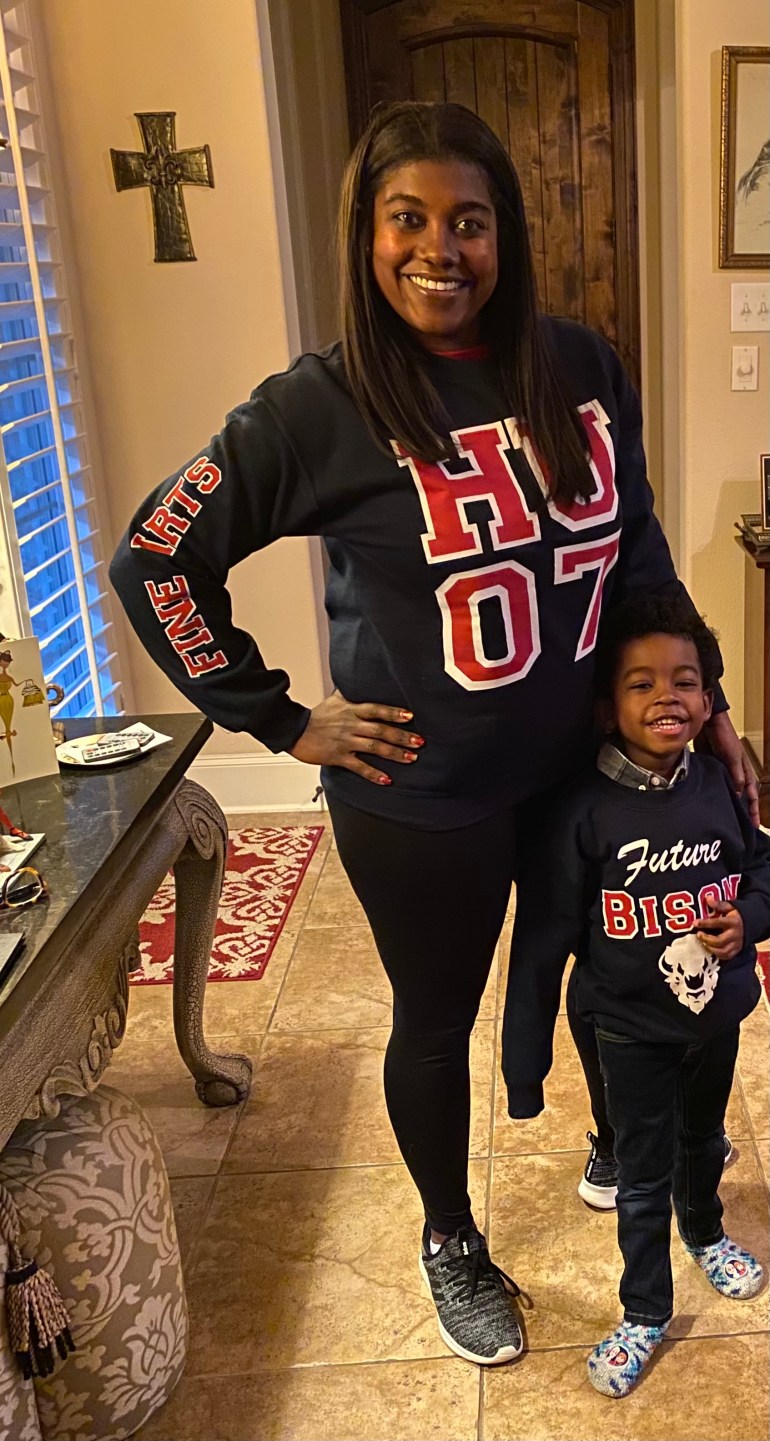
I have stopped looking for perfection. I am an artivist and creator – an activist, actress, writer and content creator – and oftentimes, I need the perfect atmosphere for my work to come forth. The pandemic has forced me to move in a place of absolute imperfection. Even as I sit to write this, my four-year-old son is hitting me on the head with Spider-Man, Buzz Lightyear and pillows.
I have learned impactful work can actually be birthed in the midst of discourse and pain – and the murder of George Floyd. After his death, I produced a video that asked a simple question we as Black mothers have: when did my baby become a threat to you? Working for myself, I have been pressured to work against a clock and windows of opportunity. No one is paying me for my work yet, so I’m riding on faith that my investment in creating change will open the doors to my career today and tomorrow. Right now, it means I’m a viable investment for myself and anyone who dares to take a chance on creating that change.
In 2020, after finally securing funding, I was going to launch my talk show, which had to be cancelled and returned to later. As of today, with very little money, I’ve created my first docuseries. I view myself as a Black mother with a vision looking for the investment needed to build a future. Along the way, I have proven to myself that I can do a lot with a dollar – or lack thereof.
This pandemic has made me step into myself a little deeper, finally taking a bet on myself. Not judging the number of hours I haven’t put into my son’s school lesson, but rather creating a world that will see and honour him. As a mother, 2020 also taught me that self-care is not a luxury; it is a necessity.
I want people to check on the mothers they know. We carry a lot, and sometimes in silence. Ask a mother about her dreams, and see how you can assist. This is the perfect time to help someone step into and become what they have only dreamt of for so long. COVID-19 has taught me my work is what I make it, the time is now, and tomorrow is not promised. One silver lining in all of this: 2020 also showed me that I could be the vice president of the United States one day.
Caitlin Kerrigan, 35, leasing professional in New Jersey: ‘I don’t believe I will ever feel secure or supported in any role as a working mother.’
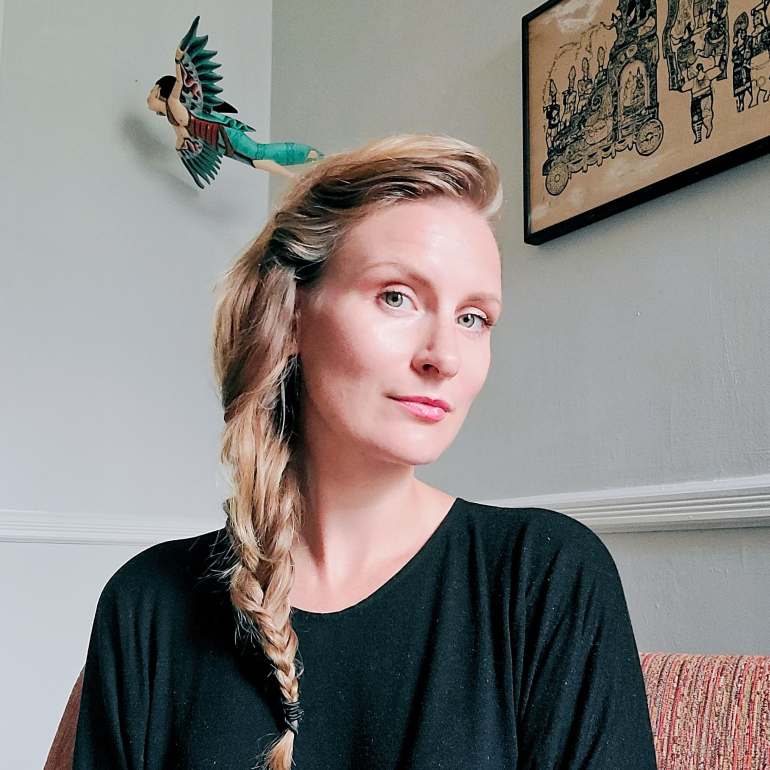
I was working as a leasing professional for a property management company. I ended up working at home alone with my two-year-old daughter while my partner — an essential worker — went into work every day. My team at work was small and my counterpart was a woman with no family. My productivity went way down trying to juggle caring for and entertaining my very active daughter. Once during a call, she ended up getting into NyQuil and I had to call the poison control hotline. It felt like I had to choose between being a good employee or being a good mom.
I started getting panic attacks and got on Zoloft. My company made a big show about “checking in with each other because we are family and we care about your mental health”. But they also expected a daily detailed account of what work was achieved every half hour of the day between 9am and 5pm. I reached out and expressed my frustrations and explained that working from home with a toddler means my day is not a 9-to-5 day, but was told that was basically too bad, that is what expected of me.
During this time, my counterpart’s productivity flourished. In September, when I was five months pregnant, I was laid off due to the company’s need to reduce staff. I was the only member of my team who was laid off and I was told it was because of my leasing numbers. I still ruminate over that conversation, as I was a reliable employee and as prior to COVID-19, my numbers were on par with that of my coworkers. I’m nine months pregnant now and still on unemployment.
I have interviewed for several positions since losing my job and have had multiple second interviews. I decided to be honest in my interviews and be open about my pregnancy and intentions on taking the average eight weeks of maternity leave. I have been advised by countless people not to disclose my pregnancy, but I feel strongly about starting off on an honest foot with a new job. I believe this has absolutely hindered my ability to get hired.
I would love to have the option to stay home with my children or work part time, but unfortunately, my family relies on my income as much as my partner’s. I feel confident that I will eventually find a new position, but I don’t believe I will ever feel secure or supported in any role as a working mother.
Ashley Austrew, 33, freelance journalist in Nebraska: ‘We can’t expect parents to be full-time caregivers and full-time workers for the long term.’
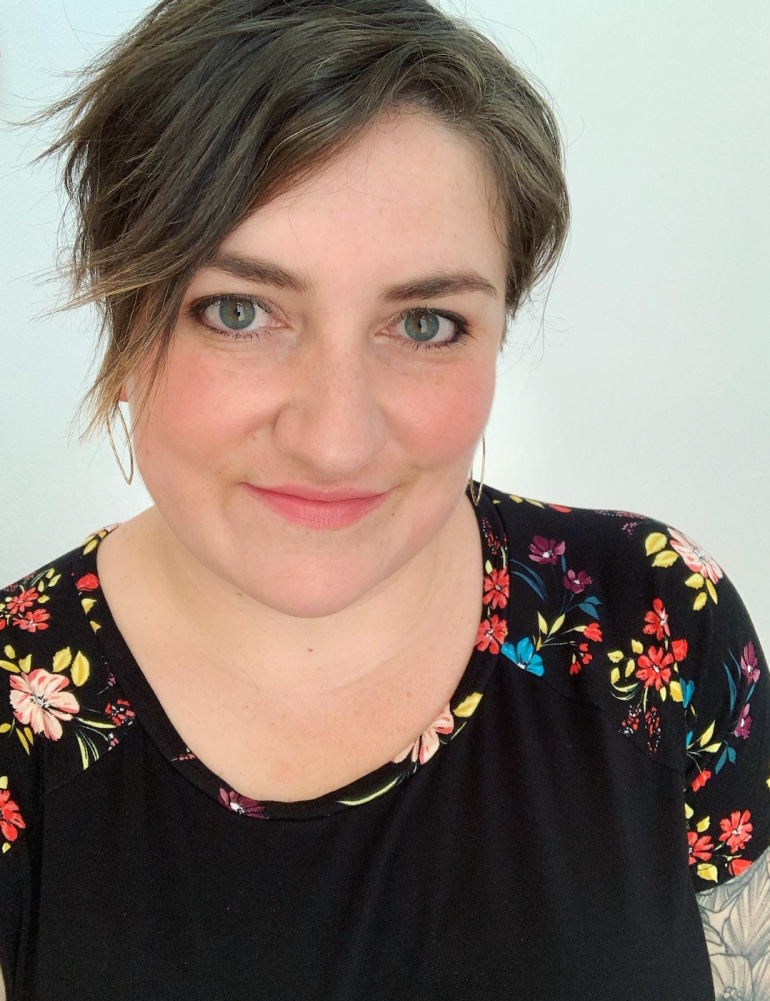
I started thinking about leaving my marketing job when the kids had been out of school for almost a month and it became clear that things weren’t likely to return to normal anytime soon. It was really hard, and I kept giving myself mental checkpoints: just get to the end of the school year, just get through the first month of summer et cetera, and then things will be better.
But when those checkpoints passed and I started thinking about the future, it became clear that something had to give. I wasn’t comfortable sending my kids back to school because many people in my area of the country aren’t taking the pandemic seriously, so I knew school would continue to eat up huge swaths of my time. Additionally, my full-time job was a contract position, and I’d been working really hard to earn that “real employee” status, but essentially found out that because of the pandemic and all of the uncertainty, the CEO had no intention of extending that offer to me. So, it became a question of whether or not my work was truly worth fighting for, and when I was really honest with myself, the answer was no.
I was earning about $55,000 per year from my full-time job, plus about $30,000 from freelance clients. So, leaving the full-time job meant giving up more than half of my income; however, I kept the freelance work I was doing and am picking up additional freelance work to make up some of the difference. I also have the added privilege of having a partner. If push came to shove, he couldn’t cover all of our expenses on his own, but he could cover a majority of them.
Because of the pandemic, we also have scaled back a lot, and our dollars stretch further in Nebraska than they might in other parts of the country. I do worry about my future earning potential since I’m not staying with a long-term job and working my way up the ladder. But my history of freelancing and contract work also means that I’ve always worried about that to some extent.
For me, it’s absurd the way Americans have been asked to carry on as normal during a pandemic. So many are unemployed or working impossible schedules because they don’t have the option to scale back at work. We can’t expect parents to be full-time caregivers and full-time workers for the long term. It is impossible.
Inge Steemans, 33, international business developer in New Jersey: ‘I had to learn to celebrate what I did accomplish during the pandemic.’
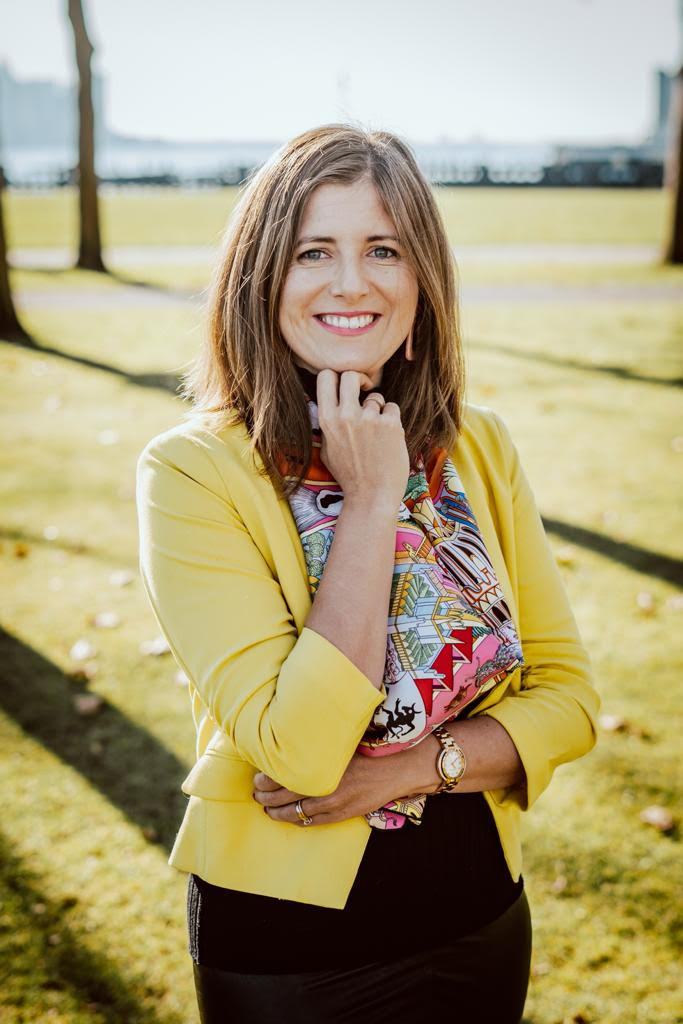
I was laid off in December 2019 and came to terms with my employer that would ensure maternity leave after my son was born in April. What helped me during the pandemic was to focus on what I could control, plan for the worst and find silver linings in tough situations. My husband and I are from Belgium, and when the travel ban hit, it was clear we would not see our family there for a long time. Luckily, my husband enjoyed steady employment and we decided to invest in our personal development while the economy was slow.
I was no longer employed, but despite the uncertainties of last year, I appreciated the possibility to bond longer than expected with my baby and my two-year-old daughter. Key success factors to my wellbeing as a mom were having access to a safe and loving daycare for my toddler and connecting with my mom community.
I tried to serve and inspire when possible, whether through making wellness packages for new moms or sharing learnings from my life coach training, which I decided to pursue this year. I am now optimistic about finding a new professional opportunity and adding the working part again to my life as a mother. Along the way, I had to learn to celebrate what I did accomplish during the pandemic and to allow and honour all emotions in the process.
Allison Paludi, 29, middle school teacher in New Jersey: ‘Albeit challenging, exhausting, and overwhelming, this year has led to the most beautiful moments as a mother and as a teacher.’
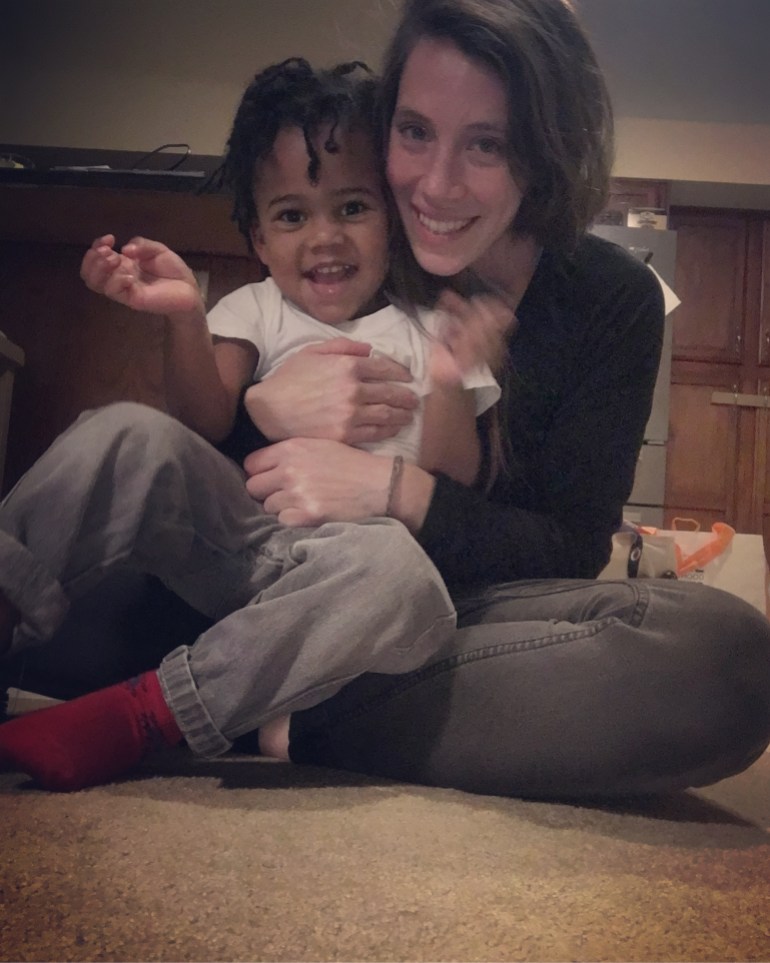
As a single mom, I face enough challenges every day. When the pandemic hit, I thought: How in the world am I going to do this? I was tasked with teaching full-time to 70 6th-grade students online and taking care of my two-year-old who, at the time, was beginning to really find his voice.
For almost one year now, I’ve had to juggle classes, parent meetings and other tasks while also performing my mom duties. I don’t have a babysitter due to COVID concerns and the financial burden. I took a cut in my stipend, so I’ve had to be extra frugal. Needless to say, my son is most definitely a part of my classroom. There are days I’ve felt so utterly stretched thin. My eyes are tired from staring at a screen. My brain is exhausted from managing a classroom of middle schoolers and managing a very busy two-year-old; my body ready to just flop.
Yet, I’ve found so much to embrace. Embracing the time I get to spend with my little one. When would I have ever had an opportunity to be home every minute of every day with my tiny human? Embracing the creativity and discussions with my students amidst a very challenging year with a viral pandemic and the exposure of a racial pandemic in the US. I’ve had some of the best classes of my teaching career amidst this being the most difficult year professionally and personally. Arundhati Roy states that pandemics are windows to a new world – a world anew – and a pathway from one world to the next. Albeit challenging, exhausting, and overwhelming, this year has led to the most beautiful moments as a mother and as a teacher.